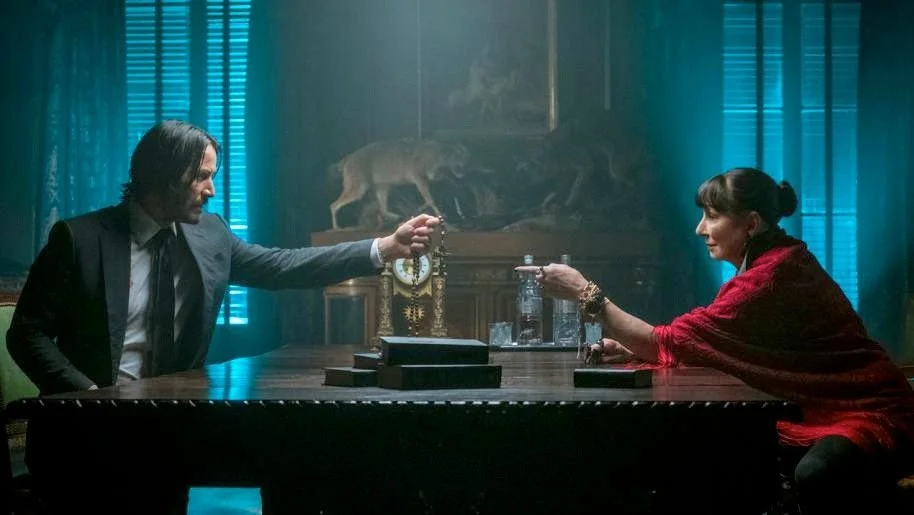“You are bound and I am Owed” growls John Wick in a scene opposite the lavishly ornate “Director” (a wonderfully overstated Anjelica Huston) in my favorite entry into the John Wick lore Chapter 3: Parabellum. In his book “The Christian Religion: An Inquiry” humanist philosopher Robert Ingersoll wrote “There are in nature neither rewards nor punishments — there are consequences”. The aspects I love so much in this franchise; are the way it discusses consequences and attaches them to most important aspects of our humanity. It's not just that he's saying the Director is bound to him, it's the “why”. Chapter 3 is the culmination of these powers in collaboration with a punctuation on the religious imagery and allegory that had been set up in the previous installments. Ingersoll wrote his words ultimately in repudiation of the moral high ground of the church and John Wick even with all it's Catholic musings and paraphernalia is the story of a man in repudiation of his church. The church in this case being “The High Table” and it's congregations of faithful cutthroats. Ingersoll in discourse with those who sought to make christianity the chief source of human morality argued at length against the belief that without the church man would simply not be able to function ethically, and he goes on through a list of folks who suggested and practiced the same exact ethical and moral ideals as the bible long before it existed as a counter. In John Wick the high table too likes to suggest that all of its rules and rituals are all “that keep us from living with the animals”. Yet time and time again in Chapter 3, it is implied if not explicitly said that our human bonds are inherent and stronger than any fealty to a power hungry enterprise meant to create a host of servants to enlarge its influence. Just before Wick let's those words “You are bound and I am owed” radiate from his mouth Anjelica Huston says “You forget that the Ruska Roma (the familial crime syndicate she and John belong to ) is bound by the high table and the high table sits above all!”. This after she announced that that “ticket” he is holding is worth nothing. She's telling him and us about the commandments, reiterating the possibility of damnation for breaking them, ( it won't be the last time) and yet when John explains before all of this he is family, and she is actually bound to that, she helps him anyway knowing full well the consequences. Damnation is what they fear not because of what it means to them, but what it could do to them, a hold religion and the church have over many of its practitioners, but when up against the things that actually mean something to them like John or ethical compassion, the people in Chapter 3 often fold. John hurtles towards damnation despite the fact that he fears it because his very nature is in direct contradiction with the essence of the church's /High Tables appeals to blind loyalty. The rest of what we see unfold are the consequences and sometimes they are good and sometimes bad, but they are always consequences of this fracture. Chapter 3 is also where “Choices” becomes a very pronounced theme. It's always been there, but in this movie you start to see a difference between cognitive decision making and involuntary reactions. Any version of the John Wick backstory doesn't give much room to believe John had much choice in where he ended up. His one choice was leaving it behind to be with his wife and this is reinforced explicitly by exposition, scenes, and by Keanu Reeves performance in 3. Parabellum marks a turn in the focus of the Wick lore. It is no longer about revenge or more accurately justice. John Wick has by the end of Chapter 2 gotten back what he wanted and paid all debtors while collecting his debts. Chapter 3 is about what happened when 2 ended…Choice (voluntary) and consequences. Up until that point it was only consequences as John Wicks actions weren't so much choices as pure consequences. You invaded my home and killed my dog, I am the consequence. You take my car I am the consequence. As a consequence of chapter one he is seen and drawn back into chapter 2, and then becomes the consequences of the decision to draw him out and double cross him. It’s the difference between a force of nature and the personification of that force. In Parabellum John Wick is actively making the choice to shoot a man on consecrated grounds and that the closing of the loop of justice is more important to him than the High Table's willingness to harbor and aid evil people. He does not arrive at this suddenly and Keanu doesn't play it as wild eyed blind fury. He makes it look controlled, thought out, and angry.
